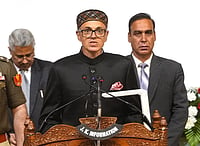“Ugly fats.”
Matter Of Fat: The Good The Bad And The Ugly
Dr Shweta Khandelwal explains the dangers of trans fats, and why nutrition is interlinked with so many other variables like fiscal and other policies and the empowerment of civil society.


That’s how Dr Shweta Khandelwal, Head, Nutrition Research and Associate Professor, Public Health Foundation of India, describes industrially produced trans fats, found in most of the ready to eat foods that we consume today. This includes baked goods such as cakes, cookies, pastries and pies, biscuits and rolls, samosas and jalebis, and even frozen pizza and non-dairy coffee creamer.
In an exclusive interview to Outlook Poshan, Dr Khandelwal, one of India’s best known nutrition epidemiologists, said that while fats were considered demons for a long time, “this is starting to? change now with evidence coming in that are some good fats too. So there are some good fats, some bad fats, and then are there ugly fats, which need to be shunned,” she said. This is because the bad fats play a major role in the rise of non communicable diseases or NCDs, like heart and other cardiovascular diseases, and even cancer, according to some studies. And these in turn are linked to nutrition, because most of them are fundamentally diet related diseases.
Also Read| Trans Fats: The Devil Is In The Details
Regular intake of industrially produced transfats raise the chances of your getting such diseases multi-fold, she said. “For one, they mess with our inflammation and stress related pathways. They also mess up our lipid metabolism.”
“Good fats” have high-density lipoprotein (HDL), while the bad ones have low-density lipoprotein (LDL). Cholesterol moves through your body while inside lipoproteins. But while HDL is known as “good cholesterol” because it takes excess cholesterol to your liver to be expelled from your body, LDL is called “bad cholesterol” because it takes cholesterol to your arteries, where it may collect in artery walls and clog them, increasing the risk of blood clots in your arteries.
“NCDs are galloping in India, and they are mostly diet related.” A diet comprising High Fat Sugar and Salts, on a frequent basis raises your chances of getting cardiovascular diseases multi-fold. Trans-fats act as a catalyst and predisposes you NCDs because it builds up LDL while decreasing HDL, she said.
Watch the full interview here:
They are also “very bad for expectant mothers. They are very bad for fetal health, and can actually cause fetal retardation, or hamper the growth and development of the fetus, which is such a critical thing.” Repeated exposure to trans fats thus leads to compromised immunity and health down the line. And if that wasn’t bad enough, there are also reports which link TFA to obesity and cancer. So “there is really nothing good about industrially produced TFA,” she asserts.
Also Read| ‘The Meanest Of All The Fats’
Which is why the Food Safety and Standards Authority of India or FSSAI, is repeatedly saying no trans fat or zero trans fats. “But there are some practical issues in bringing it down to zero but at least we can minimise them to the extent we can. The FSSAI initially curtailed this to 10 per cent, and then we went down to 5 per cent, and now we’re trying to cut it down to three and then two per cent. The WHO has set the target of 2023 to ban trans fatty acids globally, but and this is highly commendable, we in India have said we will do it one year before the deadline. But while this is highly commendable, there are various loopholes.”
For instance, how, and at what stage do we measure it? Do we have enough testing facilities? How do we deal with the huge unorganised sector? “I am sure the government is thinking about all this, but there are major challenges ahead, and unless everybody takes accountability, and grasps the perils of this fat, I don’t think it would be fair to just put the buck on the government for this.” The government must launch a major awareness campaign, particularly in the unorganised sector, secondly, we must have capacity building, and credible training and testing, she said.
According to her, there are three arms of effective policy making and implementation. One is the government, two includes academia and researchers, and the third is civil society. All three need to be on the same page for effective implementation of any policy.
Then there’s the importance of fiscal policy. Almost 40 per cent of Indians cannot afford a healthy diet. It is thus important to ensure that people not only know about the dangers of cheaplyavailable trans fats, but they must also be given the ability and option to get healthier alternatives, Dr Khandelwal said.
The lockdown and disruption of the supply chain due to the pandemic has made things worse. While the poor are deprived of affordable healthy alternatives, “people in urban areas are ordering more food from outside, which means they are essentially consuming unhealthy food.”
But “all is not doom and gloom,” she said. We can and should make healthy choices. And that is where clear labelling comes in, because it empowers the consumer by detailing the harmful orbeneficial ingredients in packaged foods. “This is all a game of three pillars.” Nutrition and awareness is one. The second one is “those factors which determine what I do with that awareness. This includes mother’s education, family income, agricultural produce....” and the third of course is policy.
- Previous Story
 Priyanka Chopra Says Guneet Monga's 'The Elephant Whisperers' Is A Trunk-Filled With Emotions
Priyanka Chopra Says Guneet Monga's 'The Elephant Whisperers' Is A Trunk-Filled With Emotions - Next Story




















